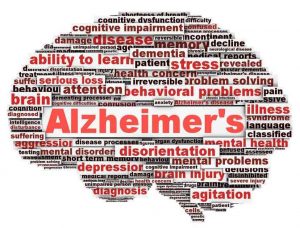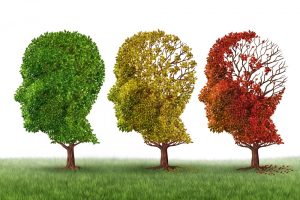Alzheimer’s disease is a degenerative disorder that affects the brain causing progressive memory loss, altering thinking and communication skills as well as behavior. Alzheimer’s is the most common form of dementia and the 6th leading cause of death amongst Americans. More than 5 million Americans are living with Alzheimer’s and more than 15 million Americans provide unpaid care for persons with Alzheimer’s and other forms of dementia. Dementia is one of the costliest conditions to society because of the patients’ many needs of increased hospital stays, adult day services, home nursing care and the fact that persons with dementia are more likely to have other chronic conditions. 
Although it is normal to have some occasional memory lapses as we age, Alzheimer’s disease is not a normal part of aging. In persons with Alzheimer’s disease, brain cells slowly begin to malfunction and ultimately they die. It is also important to note that Alzheimer’s can also attack people in as early as their 30s, 40s and 50s; it is estimated that around 200,000 people younger than 65 are diagnosed in the United Stated with younger-onset Alzheimer’s. Because of this, it is important for young people to take care of their brain health, especially those with genetic risk factors to Alzheimer’s and those living with other chronic conditions.
Alzheimer’s disease progresses slowly in 3 stages: Mild or early stage, Moderate or middle stage, and Severe or late stage.
In Stage 1, the Mild or Early stage, a person may still function independently and take part of social activities and daily tasks efficiently, but will begin to develop significant memory lapses and problems with concentration.
Stage 2, or Moderate Alzheimer’s stage, can last for many years as the person’s behavior progressively changes and a need for a higher level of care increases. In this stage, memory lapses are more pronounced, communication is affected and intellectual knowledge gets lost over time.
Stage 3, or Severe Alzheimer’s, is the final stage in which individuals experience a loss in their ability to communicate efficiently, strong personality changes take place and memory and cognitive skills worsen. Physical abilities are also highly affected, such as walking, sitting and eventually swallowing, requiring 24/7 assistance and care.
Maintaining optimum brain health should be a priority for all of us. Daily physical exercise, a balanced nutrition, socializing and engaging our brains with various activities such as puzzles, games, art, music and crosswords, are some of the ways to keep our brains active and keep our thinking process clear.
For information regarding this powerful and complex condition, including more extensive information about the stages of Alzheimer’s, symptoms, support for patients and caretakers and ways you can help, visit the Alzheimer’s Association website.
If you are or a loved one is experiencing unusual lapses in memory, changes in behavior and at times difficulty communicating properly, contact your doctor to discuss your risk factors for dementia and possible brain testing.
Call us at 954-454-6300 to serve you. Walk-ins are also welcome.


